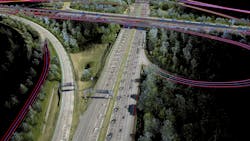GlobalFoundries and Bosch Partner to Develop Radar Chip for Cars
Globalfoundries, a leading contract chip manufacturer, said that it would partner with Bosch to develop, manufacture and test the auto parts supplier's new generation of millimeter-wave radar sensors.
Under the terms of the deal, the Santa Clara, California-based company will work with Bosch to develop a safer, more powerful radar system-on-a-chip (SoC). The new chip will be used in Bosch's advanced driver assistance systems (ADAS) to detect dangerous situations on the road ahead and confirm the car is in the correct lane, flag potential collisions, initiate emergency braking and assist with parallel parking.
Bosch is partnering with GF instead of more advanced contract chip manufacturers such as TMSC because of its leadership in radio frequency (RF), millimeter wave, and other specialty production processes ideal for chips used in radar and other areas including 5G components. GF has halted development of its most advanced chips in favor of focusing more on specialty nodes like FD-SOI.
The automotive radar chips GF is developing with Bosch will be based on its 22-nm FD-SOI node, which has been used to manufacture more than 350 million chips shipped to customers around the world, GF said. “At GF, we have embraced excellence in automotive semiconductors as a core strategy,” said Mike Hogan, senior vice president and general manager of the automobile business at GF, in a statement.
Today, large auto manufacturers rarely buy chips directly. Instead, they purchase electronic control units (ECUs) and subassemblies from Tier-1 parts suppliers including Bosch. These Tier-1 suppliers generally buy chips off the shelf from automotive chip specialists such as NXP Semiconductors, Analog Devices, Infineon Technologies, and Texas Instruments, and then assemble them into radar or other subsystems.
These Tier-2 semiconductor makers have in-house plants to roll out analog, power and other chips on legacy nodes, but they are also increasingly using foundries to manufacture auto-grade microcontrollers.
By bringing its intellectual property (IP) directly to a semiconductor foundry, Bosch is trying to differentiate itself from rivals in the automoible industry that are still buying mass-produced chips from Tier-2 firms. “Dependable radar and ADAS systems are of paramount importance to drivers and automakers around the world," said Oliver Wolst, senior vice president of Bosch's semiconductor division.
The announcement also builds on Bosch's strategy to develop more of its components internally. Bosch is on the verge of opening a semiconductor fab in Germany. It is on pace to start production in late 2021.
The radar is one of the key components of the autonomous cars of the future. These sensors can be used to corroborate what other sensors detect in the vehicle's surroundings, alerting it to other cars and obstacles. They can also detect obstacles in the dark and watch for other cars on the road while lidars, cameras and other sensors are scrambled by rain and fog, or blinded by sunlight.
The millimeter-wave radar chips will be manufactured atn GF's Fab 1 plant in Germany. The company said that it plans to deliver the first chips for Bosch's next-generation radar by the second half of 2021.
About the Author
James Morra
Senior Editor
James Morra is the senior editor for Electronic Design, covering the semiconductor industry and new technology trends, with a focus on power electronics and power management. He also reports on the business behind electrical engineering, including the electronics supply chain. He joined Electronic Design in 2015 and is based in Chicago, Illinois.

